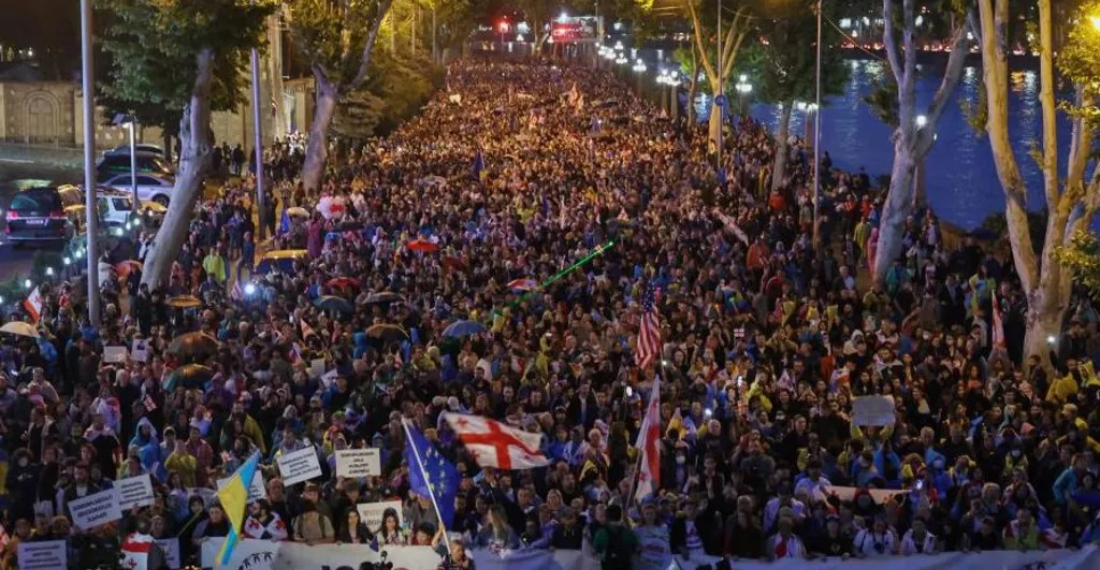A public opinion survey conducted by the Institute for Social Research and Analysis (ISSA) indicates widespread support for Georgia’s accession to the EU amongst Georgians with 86 per cent giving a positive answer. The same survey suggests that 74 per cent of the population support NATO. However, in what appears to be a contradictory finding, the survey concludes that a majority of 53 per cent back Georgia’s neutrality and think the country should keep out of all political and military alliances. “The survey on the public’s attitude towards ongoing processes in Georgia” conducted with financial support from the Civil Society Fund and the UN Association of Georgia interviewed 2,000 adult respondents in Tbilisi and other cities, as well as in rural areas, using face-to-face interviews. The survey was conducted from January 18 to 30, 2025.
A clear majority of 67.1 per cent find Prime Minister Irakli Kobakhidze’s statement on suspending Georgia’s EU accession process unacceptable. Notably, this includes 26% of Georgian Dream supporters. More than half of respondents (55 per cent) believe that Georgian Dream’s foreign policy aligns with the interests of Russia and Russia-friendly countries such as China, Iran, and others.
Civil unrest in the wake of the October election intensified after the contested Georgian Dream parliament announced the suspension of EU accession talks on November 28. According to the ISSA survey, 67% considered this decision unacceptable while around 25% deemed it acceptable.
Only 7 per cent believe Georgian Dream is aligned with Europe and the US and committed to integration into Western institutions, while up to 55 per cent believe the ruling party’s foreign policy serves the interests of Russia and countries aligned with Russia such as China, Iran and others. 30 per cent of respondents thought that Georgian Dream pursues a balanced foreign policy and does not serve the interests of any specific country.
55 per cent did not agree that Georgian Dream leaving power means a heightened risk of Georgia being dragged into a war with Russia, which the ruling party actively warned of in the run up to the October elections. 36 per cent did agree with the statement, but only 15 per cent were fully convinced.
62 per cent of survey respondents believe Georgia is heading in the wrong direction, reflecting a wider trend of palpable public anger. 60 per cent of participants expressed some level of loyalty towards the ongoing protests, with 45% identifying as active supporters. 62 per cent agreed with protesters’ main demand to hold new elections, while 76 per cent support the second key demand of the immediate release of all those arrested at demonstrations.
Concerning the elections held in October 2024, 43 per cent of respondents condemned the October vote as unfair while 16 per cent thought it was equally fair and unfair. 51 per cent said they voted for opposition parties while 32 per cent confirmed they voted for Georgian Dream and 17 per cent chose not to disclose their vote.
48 per cent view the Georgian Dream government as illegal/illegitimate while 39 per cent consider it legal/legitimate. Around 80 per cent of participants said they would vote in new elections should they be held, with 32 per cent saying they would vote for Georgian Dream and 53 per cent saying they would vote for one of the country’s four major opposition blocs. On the other hand, 38 per cent negatively assessed the performance of opposition parties after the October vote, compared to 33 per cent who assessed them positively.
The Georgian presidency, alongside the Georgian parliament, has also faced a legitimacy crisis since the inauguration of ruling party loyalist Mikheil Kavelashvili as the country’s sixth president by an electoral council comprised primarily of MPs from the contested Georgian Dream majority parliament. 40 per cent of the ISSA survey respondents consider Salome Zourabichvili, Georgia’s fifth president, to be the legitimate head of state, while 37 per cent preferred Kavelashvili. 49 per cent believe Zourabichvili has performed most strongly among various political actors, while 53 per cent negatively assess Georgian Dream’s actions since the October elections.






